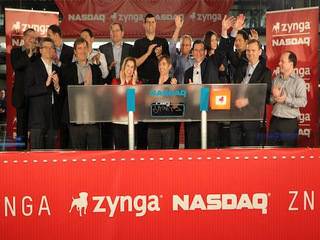
Some thoughts on the IPO market for Web companies
Public market values may be lower than late-stage private valuations

(Fred Wilson is a VC at Union Square Ventures, based in NY. This article explains his bullish views on the latest batch of Web IPOs, arguing that in aggregate they have a revenue multiple under 6.6x.)
We have an IPO market for Web companies again. I don't have all the names in front of me, but this year has brought IPOs for Pandora, LinkedIn, Groupon, Zynga, and TripAdvisor. These five companies are all trading for north of $1bn market cap. Pandora is at ~$1.5bn. LinkedIn is at ~$6bn. Groupon is at ~$15bn, Zynga is at ~$7bn, and TripAdvisor is at ~$3.5bn.
We can (and surely will in the comments) argue about these valuations. Some will say they are too high. Some will say they are too low. That's what makes a market. But in the aggregate, these valuations do not seem ridiculous to me. The public market investors are valuing these companies at prices that have some rationality to them.
What is possibly more interesting is that the public markets are valuing these companies at less than the late stage private market might value them at. Again, I don't have the data in front of me (I'm on vacation), but I believe that some of these companies had private financings at our above these current market caps.
The past decade (post Internet bubble, post Sarbox) brought a new normal to the late stage venture capital market. Companies are staying private longer. They are doing multiple rounds of growth financing privately. And they are doing multiple rounds of secondary liquidity for the founders, angels, and early investors. Mike Moritz calls these financings the "new IPOs".
This "new normal" is allowing these companies to stay private and develop into real businesses. With a lot of revenue. The five companies I mentioned at the top of this post will have close to $5bn in revenue this year. The company with the least amount of revenue is Pandora which, as of its last quarterly report, is operating at a $300mm annual revenue run rate.
These companies also have built sophisticated management teams that are highly capable of managing a business to meet the expectations of public market investors. They have strong operating executives, strong financial executives, and strong product and engineering leadership. They should be well run public companies.
The five companies I mentioned at the top of this post are carrying a combined market cap of $33bn. So they trade at an average of 6.6x revenues. And that is not including the cash they have on their balance sheets. I am not going to do the math, but I would bet if you back out the excess cash, you might see revenue multiples of less than 6x for this cohort. These are full valuations in a historical context, but these are not crazy valuations. If these companies can continue to grow at the rates they are currently growing, and if they can generate significant cash flow from their businesses (some of these companies already are doing that), then they should be more valuable in the next couple years, generating gains for the public market investors who hold the stock.
When Zynga was pricing its offering last week and getting ready to start trading its stock, I got a note from a friend who said "let's hope for a '99 style first day pop." I responded that was the last thing I wanted to see. And thankfully we did not get that.
It is not healthy for companies to trade at prices well beyond what they are worth. It puts incredible pressure on the team to deliver results that can't be delivered. And when the stock inevitably comes back to reality, the team feels like they somehow failed. Morale is impacted. The whole things is madness. And who benefits from that first day pop? Only the best customers of the banks who led the offerings. Why should they get a windfall when they did nothing to build the company and when they will be out of the stock so fast it will make your head spin?
The IPO market for web companies we have right now is rationale. We can argue whether it is pricing thse offerings correctly. But it feels about right to me. I believe we will see a bunch of IPOs next year, led by Facebook, which is the poster child of this whole "stay private longer" movement. If we as an industry can be patient, keep our companies private longer until they are truly IPO ready, then we should have a sustainable IPO market. That's where we seem to be headed. Let's not get greedy and screw it up.
Disclosure: USV has a significant holding in Zynga therefore I am long that stock through my interest in USV.
(For more from Fred, visit his blog)
(Image source: Wealthtrendsusa.com)
Related News


Investors excitedly awaiting Zynga, Yelp IPOs

Zynga breaks below IPO price, closes at $9.50

Angie's List closes at $16.26, 25% above initial price

Zynga IPO filing imminent, valued at $20 billion?

